The 'Book Review
Flash Content Drains Batteries, Macbook Air Kudos, Encrypted USB Drive with PIN Access, and More
This Week's MacBook, PowerBook, and iBook News
Compiled by Charles Moore and edited by Dan Knight - 2010.11.12
General Apple and Mac desktops is covered in The Mac News Review. iPad, iPod, iPhone, and Apple TV news is covered in The iOS News Review. All prices are in US dollars unless otherwise noted.
News & Opinion
- Flash Slashes MacBook Air Battery Life by One-Third
- Apple Preparing Fixes for MacBook Air Display Bugs
- Notebook Makers in No Rush to Fully Adopt USB 3.0
- Our Close Relationship with Laptops Isn't Without Issues
Reviews
- MacBook Air Tops Consumer Reports Ratings
- 13" Late 2010 MacBook Air: 'Quite Remarkable'
- 11" MacBook Air: What a Netbook Should Be
- 11" MacBook Air: Do the Upgrades Justify Their Cost?
- When Is a 1.4 GHz Mac Faster Than a 2.66 GHz Mac?
- 17" MacBook Pro: 'There's a Reason Why It Commands Such a Price'
Apple Updates
Products & Services
- Toshiba Introduces SSD Modules with Capacities Up to 256 GB
- Apricorn Aegis Padlock Encrypted USB Hard Drive with PIN Access
- OWC Adds 750 GB 7200 rpm Mercury On-the-Go Pro Bus Powered Portable Drive
- LaCie Releases Free USB 3.0 Driver for OS X 10.4 and Later (Mac News Review)
Bargain 'Books
News & Opinion
Flash Slashes MacBook Air Battery Life by One-Third
Electronista says Apple's decision to remove Flash from the default configuration of a new MacBook Air and future Macs may have had as much to do with battery life as version updating, testing discovered. New Ars Technica benchmark tests reveal that the 11" model gets an above-spec six hours of battery life with the default no-Flash install and several websites open - but just four with those same websites and the latest version of Flash installed.
Link: Loading MacBook
Air with Flash Cuts Battery Life by Two Hours
Link:
The Future of Notebooks: Ars Reviews the 11" MacBook Air
Apple Preparing Fixes for MacBook Air Display Bugs
The Boy Genius Report's Zach Epstein reports that early MacBook Air adopters have taken to various forums as they voice complaints about displays flickering or showing horizontal lines of varying colors when the computer wakes from sleep or after hot-plugging a display. Another bug causes the screen to fade from light to dark repeatedly after waking from sleep.
Apple's internal support system includes suggestions for interim fixes in each of these cases, but no permanent fixes are available at this time.
Epstein says Apple has stated internally that the aforementioned issues have been isolated and will be addressed in an upcoming software update.
Link: Apple Confirms MacBook Air Bugs Internally
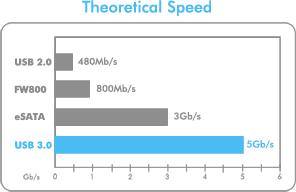 Notebook Makers in No Rush to Fully Adopt USB
3.0
Notebook Makers in No Rush to Fully Adopt USB
3.0
DigiTimes' Monica Chen and Joseph Tsai report that notebook vendors believe the notebook industry will need at least another year before fully advancing to USB 3.0, with cost and performance stability of existing USB 3.0 chips - as well as market acceptance and increased expenses from other key components - all being factors under evaluation according to sources from notebook vendors.
Link: Notebook Makers in No Rush to Fully Adopt USB 3.0 (subscription required)
Our Close Relationship with Laptops Isn't Without Issues
PR: The benefits of being "plugged in" at all times is starting to burn out some laptop users, literally, according to a study by Wakefield Research for Logitech, which finds that laptop users make significant sacrifices in exchange for mobility. Complaints are widespread, ranging from scorching heat to sub-par sound.
"People love their laptops, and they're often willing to forgo comfort in the pursuit of mobility," comments Logitech senior vice president and general manager of the control devices business unit Rory Dooley. "The irony is that they don't need to. There are accessories that can vastly improve their overall laptop experience, no matter where people want to use their laptop at their desk, on the couch, or even on the go."
Laptop users told Wakefield researchers that they consistently face issues with the heat generated from their computers, with nearly half of respondents (47%) having been obliged to temporarily quit using their laptop because the heat became unbearable, and a majority (62%) agree that the bottom of their laptop gets so hot that they could fry an egg on it. No doubt in the majority of cases a factual exaggeration, but many laptop computers these days do get awfully hot, which is one reason I persist in using a 10-year-old Pismo PowerBook (upgraded to G4 550 MHz) as my utility machine for editing and composing. The old Pismo only gets warm to touch. Wakefield Research says that desperate solutions people have tried include pillows (27%), towels (19%), and magazines (15%), none of which adequately address the problem.
"Our lineup of lapdesks can help alleviate the issues people experience with laptop heat," says Denis Pavillard, Logitech's vice president of product marketing for laptop accessories. "Options such as our Logitech Portable Lapdesk N315 are slim enough to take along in a laptop bag, and others such as our Logitech Speaker Lapdesk N700 or the Logitech Speaker Lapdesk N550, can shield users from heat and deliver rich, full stereo sound too.
Speaking of sound quality, most of the laptop users surveyed use their machines primarily for entertainment, with just 4% using their laptop exclusively at work. The trend of buying music and videos online has rapidly emerged as a common practice and people often use their PCs to listen to newly acquired digital files for the first time. However, listening to digital files on the built-in speaker on a laptop almost always leaves room for improvement, with sound quality oftentimes so poor that nearly one in three laptop users surveyed report having stopped watching a movie on their laptop because the speaker quality was sub-par. In the Wakefield survey, more than half of all laptop users reported that music sounds better on a record player (52%) than on their laptop's speakers. These numbers show that people are well aware that their laptop speakers are stuck in the past despite the fact that the technology packed inside has become exponentially more powerful.
"The speakers built into most laptops are tiny and can't always reproduce powerful audio," comments Robert Jacobson, director of product marketing for PC speakers at Logitech. "Whether you're an MP3 junkie or a movie lover, Logitech offers laptop speakers that make it easy to connect, turn the sound up and lose yourself in the things you love. There's no reason that you can't have quality audio while you're watching the newest Hollywood release on your laptop - there are solutions abound to upgrade inadequate audio performance anywhere you take your laptop.
The Logitech Laptop Survey was conducted by Wakefield Research between August 26th and August 30th, 2010. For this research, 594 interviews were fielded among nationally representative Americans aged 18 and older who own or regularly use a laptop computer, using an email invitation and an online survey. Quotas were set to ensure reliable and accurate representation of the total U.S. population ages 18 and older.
Results of any survey sample are subject to sampling variation. For this sample, the chances are 95 in 100 that the survey result does not vary by more than 4.0 percentage points (plus or minus) from the result that would be obtained if interviews had been conducted with all persons in the universe represented by the sample.
Link: Survey Finds Our Close Relationship with Our Laptops Isn't Without Issues
Reviews
MacBook Air Tops Consumer Reports Ratings
Macworld's Jason Snell notes that while Consumer Reports may not like the iPhone 4 much, "it loves loves loves the MacBook Air."
Jason reports that with a score of 67, the 11" MacBook Air received a 67 rating (out of 100), putting it in the Very Good range and making it hit the top-performer of the two 11" laptops CR tested in the category, while the 13" MacBook Air received a 78 rating (out of 100) and placed first in a much longer list of 13" laptops.
Link: MacBook
Air Tops Consumer Reports Ratings
Link: Ratings: New Laptops, Desktops,
and Netbooks (Consumer Reports)
13" Late 2010 MacBook Air: 'Quite Remarkable'
The Register's system reviews are always a thorough treatment and a good read. On the new 13" MacBook Air, The Reg's Bob Dormon says that in trying to marry concepts in both the Mac and the iPad, Apple took great pains to point out that touch devices work well as a pad (be it a trackpad or bearing down on a touchscreen) but not on a vertical computer display. Thus the new MacBook Air gets the same sized glass trackpad as the MacBook Pro range.
He also notes that the portability of the MacBook Air has to be experienced to be fully appreciated - quite a contrast with his 17" MacBook Pro - but notes that both the keyboard and the trackpad are the same size, there were no awkward compromises in usability, and traveling with the Air in a backpack was barely noticeable. As for the "instant on" experience, Dormon says Apple has pretty much succeeded, and it's hard not to be impressed with cold startup time recorded consistently in the low teens and averaging about 14 seconds. He also reports that in normal use, the MacBook Air was completely silent and at most became warm, rather than hot, while battery runtime appeared to live up to the manufacturer's claims.
Even though the 13" Air's 1.86 GHz processor speed sounds ho-hum, the machine is "very snappy". One deficiency is the lack of built-in ethernet, and you'll find the speed of the Airs startup time and near instant-on from sleep to be life-enhancing, albeit at a price.
Link: Apple MacBook Air 13in Late 2010
11" MacBook Air: What a Netbook Should Be
TechRepublic's Jason Hiner maintains that the 11" MacBook Air has broken new ground, calling it "the Mercedes Benz of netbooks" - but with one major flaw.
Hiner praises the Air's full-size keyboard and relatively powerful (especially compared to Atom-powered PC netbooks) Core 2 Duo power, noting that the the MacBook Air's performance is surprisingly strong - indeed faster than many full-sized laptops mostly due to the fact that it uses flash storage integrated directly into the motherboard rather than a conventional laptop hard drive.
Hiner also notes that while the Air is amazingly thin and light, it still maintains high build-quality and sturdy feeling as Apple's industrial-strength MacBook Pro line.
So what is the flaw? Price.
The base MacBook Air will cost you a thousand dollars, while the one with the bigger SSD and the faster processor is $1,200. Hiner says he doesn't know too many people (or IT departments) that spend more than $1,000 on a laptop any more, and business users will need to make sure that all of the software they use for their everyday tasks will work with a Mac - or alternatively end up having to use Windows with virtualization software or Boot Camp, which will add at least another $300 or so in software licenses to the cost of an already expensive laptop.
Link: 11-Inch MacBook Air: This Is What a Netbook Should Look Like
11" MacBook Air: Do the Upgrades Justify Their Cost?
AnandTech's Anand Lal Shimpi says that while the 11" MacBook Air represents the pinnacle of laptop portability - delivering the weight and form factor of a netbook but with much better performance than an Intel Atom netbook CPU - he found his typical workflow running too slow on the base 1.4 GHz MacBook Air system with 2 GB of RAM.
Apple offers two performance upgrades for the 11" Air: expansion to 4 GB of memory from the standard of 2 GB and an upmarket 11" $1,199 Air with a 128 GB SSD (twice the base machine's 64 GB) and an optional 1.6 GHz Core 2 Duo CPU for $100 more, which adds up to a $400 price premium over the standard 11-incher.
Is it worth the extra money?
Lal Shimpi investigates and determines that the answer is yes only if you think a 15% performance improvement (plus doubled drive capacity) is worth a 40% higher purchase price. In his opinion, there's almost no way to rationally justify the higher cost, especially since Apple will most likely have a faster version available within 12 to 18 months, possibly at an even cheaper price point.
He points out as well that the 13" MacBook Air remains substantially faster than even a fully-loaded 11-incher.
Link: 11-inch MacBook Air: Do the 1.6 GHz and 4 GB Upgrades Justify the Extra Cost?
When Is a 1.4 GHz Mac Faster Than a 2.66 GHz Mac?
OWC Blogger Grant says that Apple's newest revision of the MacBook Air has a secret weapon packed into its tiny little frame - rather than the poky 4200 rpm hard drive the original revision MacBook Air used, the new models sport the latest buzz-inducing hardware in high-speed data storage, a solid-state drive (SSD).
Consequently, he reports, "If you put a stock 1.4 GHz MacBook Air (2010) up against a stock 2.66 GHz MacBook Pro 13 (2010), you would find that the Air can write a 500 MB file up to 1.2x faster than the MacBook Pro. Unzipping a 1.0 GB file is up to 1.2x faster on the Air too. The Air is faster despite a 1.26 GHz processor speed difference!!! That's some SSD power."
This phenomenon is due to the SSD drive's prodigious speed, and adding an SSD can significantly improve performance for any disk-intensive activity on any computer. Grant suggests that what makes the MacBook Air particularly interesting is that Apple seems to be leveraging SSDs as a way to improve performance while keeping processor speed (and, as a result, the heat generated - see Wakefield Research/Logitech report) down.
What really caught Grant's eye, however, is something many would overlook: the MacBook Air's SSD has a transfer speed rated at up to 213 MB/s, while OWC's Mercury Extreme SSDs have a transfer speed reaching 285 MB/s. Thus, by simply upgrading your Mac with one of OWC's SSDs, you can improve your existing computer's performance significantly, and OWC conducted did a few tests just to determine how big a gain is possible.
In summary, in the 45-step Photoshop Action test resulted in speeds twice as fast as with the stock hard drive. And even if you don't use Photoshop regularly, you can realize a performance boost any time you access data on your drive. For a frame of reference, standard 5400 RPM hard drives found in most Apple laptops have a peak data transfer rate of about 80 MB/s, while the OWC Mercury Extreme SSDs max out around 280 MB/s - some three-and-a-half times faster. The Mercury Extreme SSD is able to write files to random blocks 38x faster than the stock hard drive and read random files a whopping 47x faster.
The takeaway is that by simply adding an OWC Mercury Extreme SSD to your Mac, you can enhance performance dramatically, and the older the Mac, the more dramatic the gain will be.
Link: When Is a 1.4 GHz Mac Faster Than a 2.66 GHz Mac?
17" MacBook Pro: 'There's a Reason Why It Commands Such a Price'
The Register's Shaun Dormon notes that while glossy screens and unibody construction are now a familiar sight, Apple does offer several build-to-order tweaks that aren't likely to appear on the showroom floor, including an antiglare screen and a choice between a 2.66 GHz or 2.8 GHz Core i7 CPU.
The Reg's review unit is a 17" MacBook Pro with both the antiglare screen and the entry-level Core i7 2.66 GHz Core i7 BTO option, 4 GB of 1067 MHz DDR 3 memory, and a 500 GB 5400 rpm Hitachi Travelstar hard drive, as well as an ExpressCard 34 card slot, which comes in handy to address Apple's current lack of support for USB 3.0 (see LaCie Releases Free USB 3.0 Driver for OS X 10.4 and Later in this week's Mac News Review).
Link: Apple MacBook Pro 17in Core i7 BTO Notebook
Apple Updates
Late 2010 MacBook: Apple Hardware Test Message When Power Adapter Is Not Connected
A new Apple Knowledge Base article says:
"When you test your MacBook Air (Late 2010) with Apple Hardware Test (AHT) diagnostics, you may encounter one of the following messages if the power adapter is disconnected from the computer:
"4 SNS/1/40000001: IDOR
or
4 SNS/1/40000001: VPOR
"Products Affected: MacBook Air (11-inch, Late 2010), MacBook Air (13-inch, Late 2010)
"Resolution
"Connect the power adapter before you run Apple Hardware Test. If the message appears again with the power adapter connected to the computer, contact the nearest Apple Service Provider."
Products & Services
Toshiba Introduces SSD Modules with Capacities Up to 256 GB
PR: Toshiba Corp. and Toshiba America Electronic Components, have announced the Blade X-gale SSD series, a new SSD form factor with thickness of 2.2mm - 42% thinner than the typical mSATA SSD form factor. Ideally suited for integration into space-sensitive products, including tablet PCs, laptops, mini-mobile and netbook PCs, Toshiba's latest SSD offering helps these devices achieve a super-slim profile, the MacBook Air being a prima facie example.
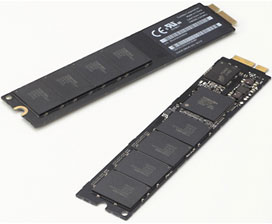 "Delivering a product that enables
superior user experience in a smaller footprint is the ultimate goal,"
noted Toshiba America Electronic Components, Inc. Memory Business Unit
vice president Scott Nelson, "The density of MLC NAND enables the
creation of smaller form factor high density storage solutions, and
Toshiba, as the technology leader for NAND storage solutions, will
continue to innovate in this space."
"Delivering a product that enables
superior user experience in a smaller footprint is the ultimate goal,"
noted Toshiba America Electronic Components, Inc. Memory Business Unit
vice president Scott Nelson, "The density of MLC NAND enables the
creation of smaller form factor high density storage solutions, and
Toshiba, as the technology leader for NAND storage solutions, will
continue to innovate in this space."
As mobile devices get smaller and lighter, yet even more feature packed than ever, the SSDs inside them must become even smaller, and thinner. Toshiba's new 64 GB and 128 GB Blade X-gale SSDs are the thinnest available within the company's comprehensive portfolio of SSD solutions, and Toshiba's advanced wiring technology assures optimized wiring layouts and data transfer rates in this new form factor. Toshiba's base design technology also minimizes board warpage during thinning, and 256 GB capacity can be achieved when mounted on both sides, the largest density in the industry for small type SSD modules. Toshiba also offers designers a choice of mSATA and Half-Slim SSD modules in capacities up to 128 GB.
"Until recently, storage designers looking for high capacity storage had accommodated the size of HDD into their designs," says Nelson. "Up to this point, SSD designs also followed the basic design of small form factor HDD - which does not fully leverage the capabilities of high density NAND technology. Toshiba's module-based SSDs break with this approach, giving hardware designers greater freedom and flexibility in enabling their product design."
Editor's note: While Toshiba isn't saying so, these new drives appear to be the same ultra-thin SSD used in Apple's MacBook Air, reportedly with the same model numbers and storage capacities of 64 GB, 128 GB, and 256 GB, and with a maximum sequential read speed of 220 MB/s and a maximum sequential write speed of 180 MB/s. cm
Link: Toshiba SSDs
 Apricorn Aegis Padlock Encrypted USB
Hard Drive with PIN Access
Apricorn Aegis Padlock Encrypted USB
Hard Drive with PIN Access
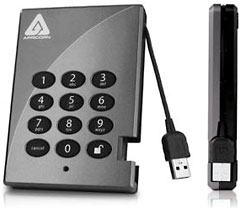 PR: Looking for an effortless way to secure your
data? The Aegis Padlock Secure Drive is the ultimate portable hard
drive and secure storage system. With an easy-to-use keypad design and
software free setup, the Aegis Padlock Secure Drive enables you to
access the drive with your own unique pin.
PR: Looking for an effortless way to secure your
data? The Aegis Padlock Secure Drive is the ultimate portable hard
drive and secure storage system. With an easy-to-use keypad design and
software free setup, the Aegis Padlock Secure Drive enables you to
access the drive with your own unique pin.
With no software to install, easy setup and your choice of realtime 128-bit or 256-bit AES encryption, the Aegis Padlock Secure Drive is an ideal tool to protect your data, your customers and your business.
- Military Grade FIPS PUB 197 Validated Encryption: Featuring your choice of AES-128 or 256-bit hardware encryption, the Aegis Padlock seamlessly encrypts all data on the drive in real-time, keeping your data safe even if the hard drive is removed from its enclosure.
- Brute Force Self Destruct Feature: The Aegis Padlock uses a three pronged approach to protect against a Brute Force attack. The first step is to deny access to the drive until the drive can verify the user PIN. After several incorrect attempts the drive will lock itself, requiring the drive to be plugged in again to input a PIN. This feature blocks automated attempts to enter PIN numbers. Lastly, after a predetermined number of failed PIN entries, the Padlock assumes it is being attacked and will destroy the encryption key and lock itself, rendering the data useless and requiring a total reset to redeploy the Padlock.
- VTC Technology: Protection against hacker attempts doesn't stop with Brute Force. Incorporated into the Aegis Padlock's electronics is Apricorn's Variable Time Circuit (VTC) technology, working to thwart timing attacks aimed at accessing the drive by studying the behavior and infiltrating the Padlock's electronics.
- Software Free Design - Setup takes just minutes: With no software installation required for setup or operation and the ability to run on any platform, the Aegis Padlock Secure Drive provides stress free deployment in corporate environments. Its Administrator Feature allows enrollment of up to ten unique user ID's and one administrator, making it a useful business collaboration tool.
- Wear Resistant Key Pad: Designed with protection in mind, the entire Aegis Padlock family incorporates wear resistant keypads to hide key usage and avoid tipping off a potential hacker to the commonly used keys.
- Data at Rest Protection: All data, PINs, and encryption keys are always encrypted while at rest.
- Compact, Rugged Design Perfect for taking your data on the road: The Aegis Padlock's low powered design is perfect for using with notebooks and taking your data on the road. Perfectly pocketable, the Aegis Padlock's compact, robust design features a 16-point omnidirectional shock mounting system, protecting the drive from drops and knocks. The convenient integrated USB cable eliminates the need to carry around cords with you and allows you to be connected at the flick of a fingertip.
Think that the Aegis Padlock may be a fit in your IT Security Plan? Apricorn offers free Corporate Evaluations of our secure hard drives to qualified customers and IT professionals. More information on website.
Product Features
- Convenient ultraportable design - Ideal to take between home and the office or on trips
- Hardware Encrypted Drive - Real-time 128-bit or 256-bit AES encryption seamlessly encrypts all data on the drive, protecting the drive even if it is removed from it's casing
- Simple to use PIN Access
- Administrator Password feature - Ideal for IT departments looking to secure their mobile users, by allowing setup of administrator access to the drive before being distributed to their mobile user(s).
- Bus powered - Bus powered from standard USB Port
- Integrated USB cable
- Extensive Shock Mounting - Protects your data with a 16-point omnidirectional shock mounting system
- Perfect for companies dealing with sensitive information - The Aegis Padlock is the perfect option for companies that need to take sensitive information on the road, such as government or financial institutions
- Secure mobile storage for the road warrior - Excellent for transporting data between desktop & notebook computers, or a secure mobile storage system
- Worry free 3 year warranty
- Allows up to 10 PIN Passkeys
- Choice of real-time 128-bit or 256-bit Military Grade AES Hardware Encryption
- Utilizes FIPS PUB 197 Validated Encryption Algorithm
- Wear resistant key pad
- Brute Force Self Destruct feature
- Integrated USB cable
- Extensive shock mounting
- Software free design
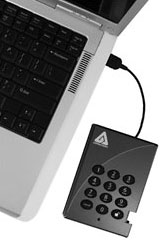 System requirements: Compatible with any OS - Windows,
Mac & Linux
System requirements: Compatible with any OS - Windows,
Mac & Linux
The Aegis Padlock external hard drive ships with an integrated USB cable, a Y-auxiliary power cable, travel pouch and Quick Start Guide.
- AES-128, 250 GB, $89
- AES-256, 250 GB, $109
- AES-128, 320 GB, $99
- AES-256, 320 GB, $119
- AES-128, 500 GB, $129
- AES-256, 500 GB, $149
- AES-128, 640 GB, $149
- AES-256, 640 GB, $169
- AES-128, 750 GB, $179
- AES-256, 750 GB, $199
Link: Aegis Padlock (also available from Amazon.com with free Super Saver shipping)
OWC Adds 750 GB 7200 rpm Mercury On-the-Go Pro Bus Powered Portable Drive
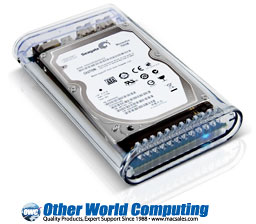 PR: Other World Computing (OWC) has added four new
750 GB 7200 RPM models to its award-winning OWC Mercury On-The-Go
Pro™ bus powered portable storage solution line. The Mercury
On-The-Go Pro is a high-performance, pocket-sized portable storage
solution for Mac or PC users featuring FireWire 800, FireWire 400, USB
3, and/or USB 2.0 interfaces for real world data transfer speeds up to
170 MB/s. Available with up to 1.0 TB of storage capacity, the Mercury
On-The-Go Pro can hold up to one million JPEG photos, 500 DVD movies,
76 hours of digital video, or 350,000 MP3 songs.
PR: Other World Computing (OWC) has added four new
750 GB 7200 RPM models to its award-winning OWC Mercury On-The-Go
Pro™ bus powered portable storage solution line. The Mercury
On-The-Go Pro is a high-performance, pocket-sized portable storage
solution for Mac or PC users featuring FireWire 800, FireWire 400, USB
3, and/or USB 2.0 interfaces for real world data transfer speeds up to
170 MB/s. Available with up to 1.0 TB of storage capacity, the Mercury
On-The-Go Pro can hold up to one million JPEG photos, 500 DVD movies,
76 hours of digital video, or 350,000 MP3 songs.
The Mercury On-The-Go Pro 750 GB 7200 RPM line features four models, including a "Triple Interface" model for FireWire 800/400 and USB 2.0; a Combo Interface model for FireWire 400 and USB 2.0; a USB 3.0 SuperSpeed model for USB 3/2.0 Backwards; and a USB 2.0 model all available immediately priced from $134.99 from Other World Computing.
In addition to the newest models, Mercury On-The-Go Pro models are available with up to 1.0 TB in 5400 RPM models and also available with Solid State Drives (SSD) with models currently up to 240 GB.
Pocket-Sized & Bus Powered - Ideal for the Mobile Office
Designed for the active On-The-Go computer user who needs the largest and fastest portable storage solution available on the market, the OWC Mercury On-The-Go Pro is compact at 3.5"x 5.5"x 1" in size - small enough to fit into a shirt pocket, yet big enough to offer up to 1 TB of capacity. Stylishly engineered in a sleek, acrylic enclosure, the Mercury On-The-Go Pro is bus-powered, so it doesn't require an AC adapter, which makes it ideal for presentations, multimedia, law enforcement, surveyors, and other mobile office uses. Additionally, notebook users with internal 5400 RPM drives will find that using the OWC Mercury On-The-Go Pro 7200 RPM and SSD models as a startup disk offers faster system bootup and overall system performance.
Featuring a variety of FireWire and USB interfaces, the Plug-and-Play ready Mercury On-The-Go Pro can be used with Macs and PCs for additional storage capacity, transporting large files between multiple computers and real-time A/V editing. The drive can also be used with storage capable digital cameras and camcorders with FireWire and/or USB data ports for quick, convenient backups of images and video while on the road.
"Since we launched the first Mercury On-The-Go Pro in 2001, this pocket-sized powerhouse has established numerous industry innovations in portable storage," says Other World Computing CEO Larry O'Connor. "As the first 750 GB 7200 RPM portable drive on the market, this best selling Mercury On-The-Go Pro solution line continues to deliver best in class portable performance and convenience."
Key Mercury On-The-Go Pro Features:
- Mac and PC compatible
- Fully suitable for Audio/Video applications
- Compact size: 3.5"(W) x 5.5"(D) x 1"(H)
- Lightweight: 11 ounces empty case, 2.5 lb. with drive
- Bus powered or may be powered with AC adapter
- High performance bridge chipset.
- Uses 2.5" Serial ATA (SATA) hard drive or SSD
- Up to 16 MB hard drive data cache
- Real world data transfer speeds up to 170 MB/s
- Cool blue activity LED
- Super quiet fanless operation
- Clear, shock resistant polycarbonate acrylic case design
- Includes carrying case, all interface connection cables, and three year complete solution warranty
- Includes $200 retail value disk utility software bundle: Carbon Copy Cloner, Prosoft Engineering Data Backup 3, NovaStor NovaBACKUP, and Intech HD SpeedTools Utilities™
Link: Mercury On-The-Go Pro
Bargain 'Books
For deals on current and discontinued 'Books, see our 13" MacBook and MacBook Pro, MacBook Air, 13" MacBook Pro, 15" MacBook Pro, 17" MacBook Pro, 12" PowerBook G4, 15" PowerBook G4, 17" PowerBook G4, titanium PowerBook G4, iBook G4, PowerBook G3, and iBook G3 deals.
We also track iPad, iPhone, iPod touch, iPod classic, iPod nano, and iPod shuffle deals.
Join us on Facebook, follow us on Twitter or Google+, or subscribe to our RSS news feed
Links for the Day
- Mac of the Day: Power Mac 8200, introduced 1996.04.22. The minitower version of 7200 was never sold in America.
- Support Low End Mac
Recent Content
About LEM Support Usage Privacy Contact
Follow Low End Mac on Twitter
Join Low End Mac on Facebook
Favorite Sites
MacSurfer
Cult of Mac
Shrine of Apple
MacInTouch
MyAppleMenu
InfoMac
The Mac Observer
Accelerate Your Mac
RetroMacCast
The Vintage Mac Museum
Deal Brothers
DealMac
Mac2Sell
Mac Driver Museum
JAG's House
System 6 Heaven
System 7 Today
the pickle's Low-End Mac FAQ
Affiliates
Amazon.com
The iTunes Store
PC Connection Express
Macgo Blu-ray Player
Parallels Desktop for Mac
eBay

